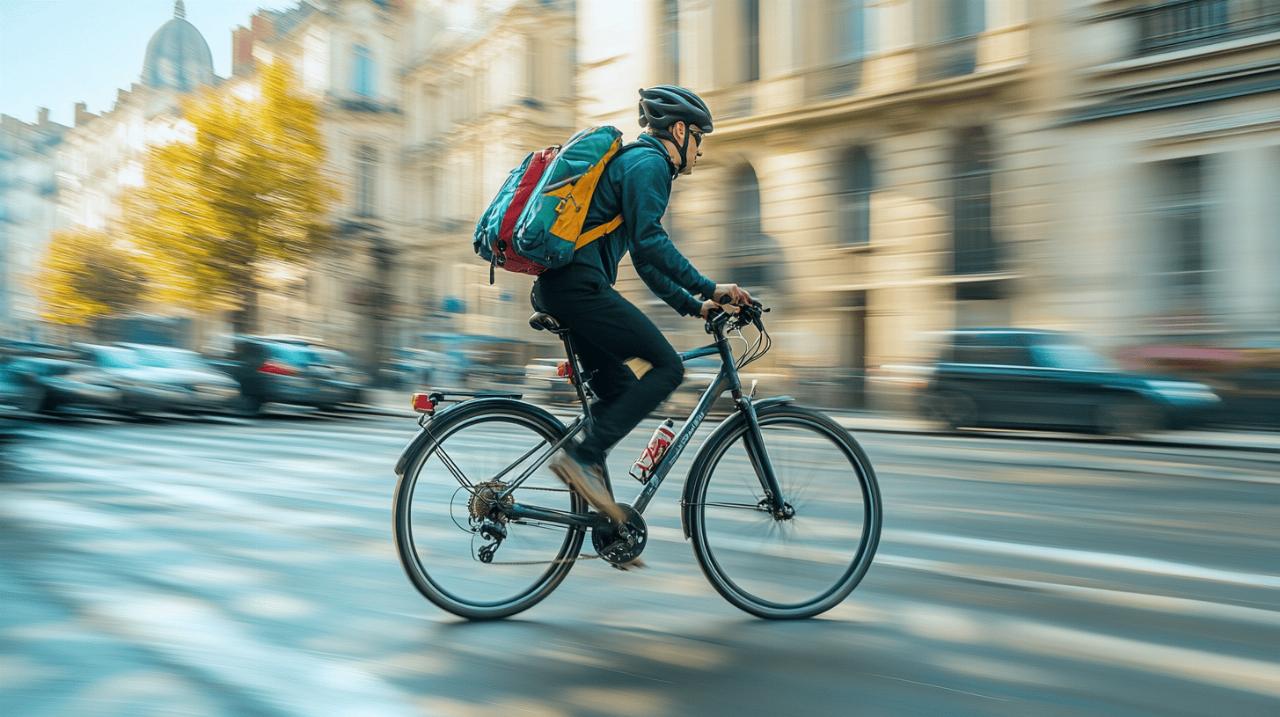Self-Employment Laws: Comment Devenir Coursier a Velo a Lyon? Legal Responsibilities Explained
For those seeking to join the growing trend of bicycle couriers in Lyon, understanding the legal framework of self-employment in France is essential. This career option offers remarkable flexibility and the opportunity to explore Lyon's beautiful streets while earning a living. Before diving into this entrepreneurial venture, it's crucial to grasp both the practical and legal aspects of becoming a self-employed bicycle courier.
Getting Started as a Bicycle Courier in Lyon
Entering the bicycle courier industry in Lyon requires proper preparation and understanding of the legal requirements. The surge in popularity of delivery services like Stuart and Deliveroo has created numerous opportunities for self-employed couriers throughout the city. This growing market makes it an attractive option for those seeking independent work with flexible hours.
Essential equipment for bicycle delivery
Success as a bicycle courier begins with the right equipment. A reliable bicycle is your primary tool, with many professionals opting for cargo or electric models to handle deliveries efficiently across Lyon's varied terrain. Investing in a quality delivery bag is equally important for keeping items secure and properly insulated during transport. Beyond these basics, self-employed couriers must consider personal safety equipment and appropriate insurance coverage to protect against potential liabilities while operating independently.
Registering your self-employment status
Before making your first delivery, you must establish your legal status as a self-employed worker. In France, bicycle couriers typically register under the Micro-Entrepreneur status (formerly known as auto-entrepreneur). This registration process involves declaring your business activity to the appropriate authorities and understanding that, unlike employees, self-employed individuals aren't paid through a PAYE system and have different rights and responsibilities. Being properly registered means you'll be responsible for your own tax arrangements and social security contributions.
Navigating lyon's delivery landscape
Lyon's unique geography and urban layout create both challenges and opportunities for bicycle couriers. Understanding the city's structure is essential for building a successful delivery business and maximizing your earning potential.
Mastering lyon's geography and delivery hotspots
Familiarity with Lyon's districts and neighbourhoods is fundamental for efficient deliveries. The city features distinct areas with varying levels of delivery demand, from the bustling restaurant scene in Presqu'île to the business districts around Part-Dieu. Learning the layout of these areas, including one-way streets, bicycle lanes, and pedestrian zones, will significantly improve your delivery times. Many successful couriers recommend spending time mapping the city and identifying key landmarks before starting work. This knowledge becomes a valuable asset that directly impacts your earning potential and work efficiency.
Peak hours and strategic route planning
Understanding demand patterns across different times of day allows couriers to maximize their income through strategic scheduling. Lunch rushes and dinner hours typically offer the highest volume of delivery requests, particularly in restaurant-dense areas. Developing efficient routes that minimize distance while maximizing deliveries requires both practical experience and careful planning. Weather conditions in Lyon can vary significantly throughout the year, so adaptability in route planning becomes essential during adverse conditions.
Self-employment legal framework in france
The French legal system has specific provisions for self-employed workers that differ significantly from those of traditional employees. Understanding these distinctions is crucial for operating legally as a bicycle courier in Lyon.
Micro-entrepreneur status requirements
The Micro-Entrepreneur status is the most common legal framework for bicycle couriers in France. This classification comes with specific responsibilities that differentiate it from traditional employment. Under French Labour Code, independent contractors are defined as individuals who determine their own working conditions or have them defined in a contract with their customer. The key factor that distinguishes self-employed couriers from employees is the absence of a subordination relationship. This means you work without permanent instructions or orders, arrange your own working hours, and use your own equipment. Self-employed couriers must register themselves with appropriate authorities rather than being registered by an employer.
Tax obligations for independent couriers
As a self-employed courier, you're responsible for managing your own tax affairs. This includes paying income tax on your profits and handling your social security contributions independently. Unlike employees who benefit from employer contributions and withholding, self-employed individuals must track their earnings, maintain proper financial records, and make regular declarations to French tax authorities. It's worth noting that independent contractors in France do not have access to unemployment benefits that traditional employees receive. Understanding these tax obligations is essential to avoid potential penalties and ensure compliance with French tax laws.
Building your courier business in lyon
 Beyond the legal requirements, developing a sustainable courier business requires strategic approaches to finding work and managing your schedule effectively.
Beyond the legal requirements, developing a sustainable courier business requires strategic approaches to finding work and managing your schedule effectively.
Joining established delivery platforms
Most new bicycle couriers in Lyon begin by partnering with established delivery platforms that connect them with customers. Companies like Deliveroo, Uber Eats, and Stuart provide access to a steady stream of delivery requests through their applications. Each platform has its own registration requirements and commission structures, so comparing options is advisable. While these platforms provide immediate access to work, they also place certain constraints on how you operate. Understanding the contractual relationships with these platforms is important, as French courts have occasionally ruled on the employment status of platform-based workers.
Creating a sustainable work schedule
One of the primary advantages of self-employment is schedule flexibility, but creating a sustainable routine remains important for long-term success. Many couriers find that balancing peak earning periods with adequate rest is essential to avoid burnout. Since independent contractors arrange their own working time, you'll need to develop discipline in scheduling to ensure consistent income. Connecting with other couriers through community groups can provide valuable insights into optimizing your schedule and managing the physical demands of the job. This community connection also creates opportunities for knowledge sharing about legal changes affecting self-employed couriers in France.
Understanding french labour laws for bicycle couriers
Becoming a bicycle courier in Lyon presents a brilliant opportunity for those seeking flexibility and independence in their work life. As the demand for delivery services continues to grow with companies like Stuart and Deliveroo expanding their presence, many individuals are considering this career path. However, before hopping on your bike and starting deliveries around Lyon's picturesque streets, it's crucial to understand the legal framework that governs self-employed bicycle couriers in France.
Employment status and subordination relationships
Under French Labour Code, the distinction between employees and self-employed couriers hinges primarily on the « subordinationrelationship » concept. Self-employed couriers define their own working conditions or establish them through a contract with their customers. Unlike employees who follow orders, are monitored on task performance, and face consequences for improper execution, self-employed couriers operate without permanent instructions or orders.
When working as a self-employed bicycle courier in Lyon, you'll need to demonstrate genuine independence in your operations. This means arranging your own working time rather than following company hours, using your own equipment (bicycle, delivery bag), maintaining multiple clients rather than working exclusively for one platform, and registering yourself rather than being registered by an employer. These factors are essential for French authorities to recognise your self-employed status and avoid reclassification issues.
Social security contributions and protections
Self-employed bicycle couriers in Lyon must manage their own tax affairs and social security contributions, unlike employees whose payments are handled through PAYE systems. As a self-employed courier, you're responsible for paying income tax on your profits and making your own social security contributions directly to the relevant French authorities.
It's worth noting that self-employed status comes with different protections compared to employment. While you gain flexibility and independence, you won't receive unemployment benefits, sick pay, or holiday pay. Regarding contract termination, commercial law applies rather than employment law protections. A significant French Supreme Court decision (22 January 2013) established that if a customer doesn't respect the agreed notice period, independent contractors are entitled to compensation – offering some protection for self-employed couriers.
For bicycle couriers in Lyon, understanding these legal distinctions is vital for operating properly within the French system. Setting up as self-employed requires registering with the appropriate authorities, obtaining the necessary insurance, and maintaining proper financial records to satisfy tax requirements. While the freedom of self-employment appeals to many, being aware of your legal responsibilities and the reduced protections compared to employment status ensures you can make informed decisions about your courier career in Lyon.
